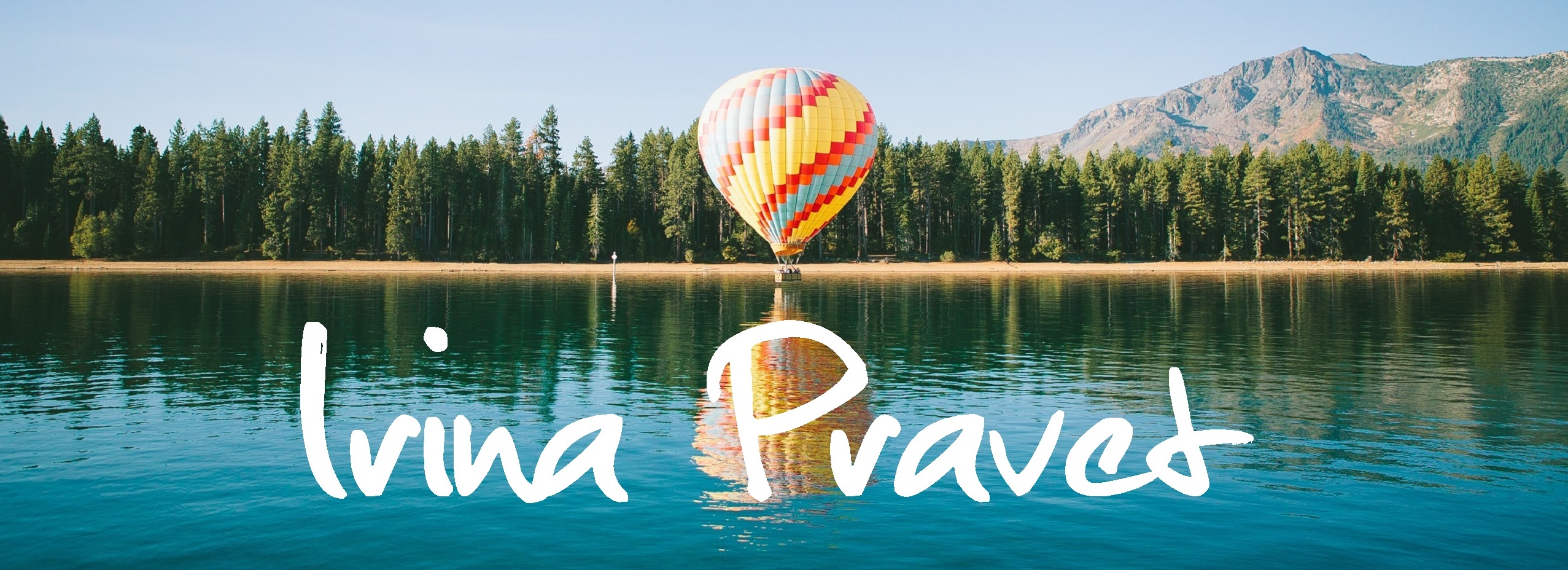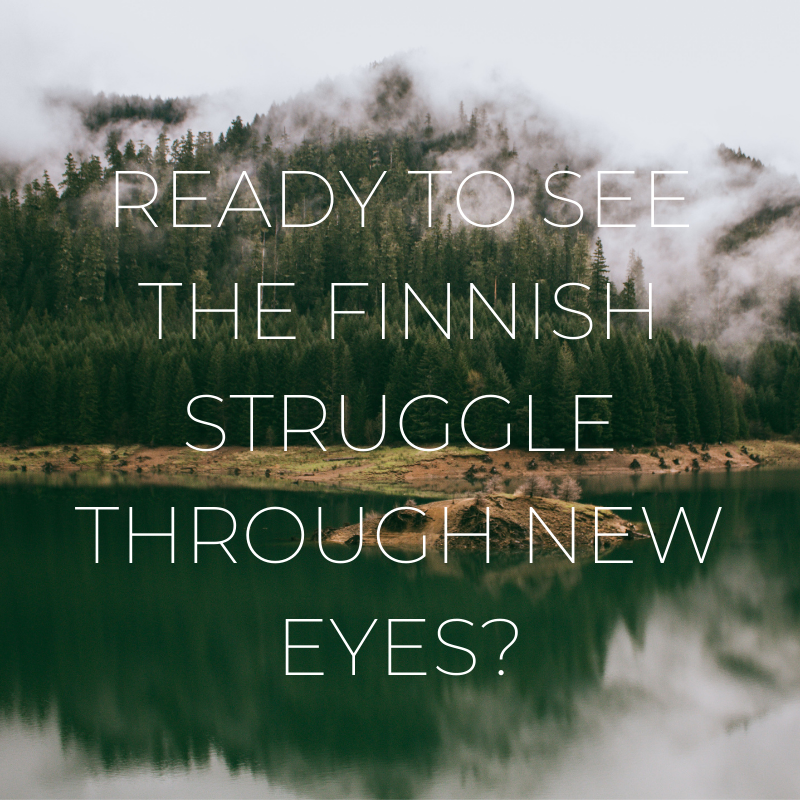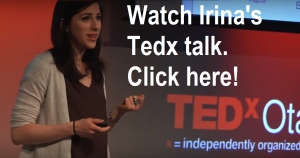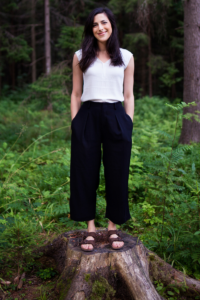 My name is Irina Pravet and I’m a language and cultural transitions coach. Basically,
My name is Irina Pravet and I’m a language and cultural transitions coach. Basically,
- I help people tap into their inborn ability to learn Finnish,
- and feel at home in their lives abroad.
On a language level, I believe each of us is born with an innate ability to adapt to language — to our linguistic environment. It’s our birthright. So I help people connect with learning the language in a joyful, intuitive way, that many of us never experience in the traditional classroom.
On a cultural transitions level, I believe we can make our home and thrive anywhere in the world. As humans, we adapt. It’s what we do and we’ve been doing this a loooong time. The process isn’t instantaneous, as mainstream culture would have us believe. Though it’s easier than ever before to move to the other side of the globe, this fast-paced world does little to prepare us for the internal transitions that follow.
As an entrepreneur in a budding field, my job title is often changing: from coach to speaker, workshop facilitator, writer, vlogger, teacher, guide — or all-around creative. What doesn’t change is my intention: I’m here to help people find inner peace and harmony in the midst of cultural and linguistic transitions.
My work brings together the threads that have run deep throughout my life: transitions, adaptation and belonging (between languages and cultures).
Why does this matter so much to me and why do I believe this work is essential? Well to answer this question, I’d have to start at the beginning.
Back to the beginning
I was born in communist Romania, just 20 months shy of the revolution that would topple the political system that had been in place since before my parents were born.
The winds of change swept through Romania after the revolution, but it seemed systemic change would be slow. Though initially hopeful, my parents decided their best bet would be to take advantage of their newfound mobility and immigrate to French-speaking Canada.
As trilingual speakers of Romanian, English and French, my mom and dad were ideal candidates for immigration to Quebec. They applied, we were accepted, and 6 months after my 5th birthday, I took my first airplane ride to Montreal, Canada to start life anew.
I spoke a few words of English at the time, but we were encouraged to speak French in kindergarten. We had an amazing teacher that made learning French an adventure. She was aware that transitions for such young kids was complex, and did her best to create the conditions under which we could thrive. And thrive we did! Though initially frustrated by my inability to express myself, I learned French in 3 months. To this day, I consider Marie-France Bertrand the best language teacher I’ve ever had.
After wrapping up grade 3 in Montreal, we moved to Toronto, in English-speaking Canada. There, I attended my first English-speaking school for three years. By my 10th birthday, I was indistinguishable from a native speaker in three languages: Romanian, French and English.
I remember adults were always asking me: “Where do you like it best: in Canada or in Romania? In Montreal or in Toronto?” I never understood their questions. I was where I was and each place was different. I enjoyed what there was to enjoy about where I happened to be.
In Toronto, I tranfered over to a bilingual French-English school so I wouldn’t lose my French. I took up Spanish and German in high school, after having fallen in love with the German language at the age of 8.
When asked what I wanted to do ‘when I grew up,’ my answer was very simple: “Speak German.”
“But that’s not a career,” my parents pleaded.
I didn’t know what to tell them: German felt like my path.
I moved back to Montreal for my undergrad and focused on German (and business — my parents and I compromised.) The move back to the city I’d lived in as a child was much more challenging than I’d expected. After growing up trilingual, I felt trapped in an English-speaking bubble that I wasn’t sure how to break out of. Being back in Quebec was not the home-coming I’d imagined. I felt rejected and like an outsider (though I wouldn’t realize the reasons for this until years later).
All the while, I was losing my Romanian, my Spanish, and even my French. My multilingualism was a cornerstone of my identity and being unable to maintain my languages felt like losing important parts of myself. Belonging wasn’t a word I thought about back then, but the feeling of not belonging was front-and-center in my life at the time.
In an effort to escape Montreal and follow the German impulse I’d been nurturing for years, I went on exchange in Mannheim, Germany. That’s where my path collided with a Finn named Juha, who I call my husband today.
To sum a story with many twists and turns, I returned to Montreal to finish up my last semester, graduated, packed my bags and moved to Finland in January 2010. My thinking at the time was that:
- I had no idea what I wanted to do career-wise and getting a job in Toronto with 2 weeks vacation a year felt like a death sentence. Spending time in Europe had opened my eyes to a new way of living, and my Romanian passport allowed me an easy move to Europe.
- Juha and I weren’t ready to end our relationship because of a ‘little logistical issue’ like geography. We wanted to see where things would take us.
- I know it sounds weird, but I was excited to learn and really master Finnish. To me, Finnish was a ‘linguistic challenge’ I was ready to take on.
- I figured, if I didn’t like Finland, Canada was always just a plane ride away.
A New Beginning in Finland
*Cue the beginning of my new life in Finland*
It was shiny, exciting, terrifying and paralyzing all at the same time.
My mom hit the nail on the head when she pointed out: “You had really high expectations for fitting in in Finland.”
To which I replied: “Why wouldn’t I have high expectations?”
To me, I’d integrated in Quebec in 1993, in Toronto in 1997 and I knew I could do it again in Tampere in 2010. (I still think this stubborn naiveté is what guided me towards the eccentric, non-traditional path I’m on now.)
Although I made good progress with Finnish in the beginning, I couldn’t find a path towards reaching the level of fluency I knew was possible — nor integrating into Finnish society as I’d expected.
It took me a couple of years, trial and error, shedding my ego and shame around ‘failing at learning Finnish’ and ‘not actually being good at languages’, tons of growth, but I finally did it: I managed to overcome systemic obstacles, to reach a level of Finnish beyond my wildest dreams! (Though I’ll always be learning and don’t believe in language as a destination, this was a huge milestone for me.)
It was a peak experience that lasted a year, during which I merged with the Finnish language and embodied it as fully as ever. I lived Finnish — or it lived me, I’m never sure how it really goes — and experienced the benefits that went along with it. My brain was fully immersed, and Finnish pulsed through my neural pathways in unprecendented ways. I cannot find the words to describe how life-changing and euphoric this experience was for me.
As a result, I experienced massive massive shifts in terms of how I see, not just Finnish, but language learning overall.
What I learned in the process was a whole new way of viewing language learning, based on the intuitive, feel-good experiences I’d had back in kindergarten, and managed to re-create, in part, in Finland.
The way I learned language in my first 12 years stood in stark contrast to the near-traumatising experiences of learning languages in traditional classrooms. I compiled this approach to language learning in a 9-week program that introduces people to a radically new paradigm and approach to language learning. The program is aptly called: Finnish Through New Eyes.
Finding Belonging in Finland
As for ‘integrating into Finnish society’ — my friend, where do I even begin?
Let’s say my intention has changed more times than I can count. I no longer see things as I did ten years ago when I landed here, but today what I’m interested in — above all — is the inner peace and harmony that comes from feeling at home in one’s self.
It took me years to realize that I’d been running with no ground beneath my feet: between countries, languages and groups of people, without really feeling I had a place to lay my head. Someone was always ready to say I wasn’t:
- Romanian enough, I moved away when I was 5
- Quebecois enough, I wasn’t born Quebecois
- Canadian enough, I don’t live in Canada anymore
- Finnish enough, I wasn’t born here
- or that I had a ‘slight accent’ in any and all the languages I spoke
All I can say is that this pain had to reach a breaking point before I was able to see not-belonging as a gift: an invitation to create a new way of being for myself.
First and foremost, I belong to myself.
I realized no one else gets to decide where I belong but me.
I’m able to choose my identity accordingly.
I do not expect others to understand or even validate my choices and experiences — they are free to do that for themselves, and I am free to do it for myself. I’ve never fit into boxes so I get to choose between multiple ones. I choose to live the best of these worlds.
I cointed this ability to choose between places and tongues multibelonging and my website and newsletter has recently become a safe-haven for other multibelongers like myself. Welcome!
The Unanticipated Gifts
This journey has taken me to places I never imagined going to or wanting to go to. Trust me when I say there are few stones I’ve left unturned as I’ve questioned everything life has served up. Unbelievably, there’s always more to learn!
Along the way, I’ve faced challenges both physical, emotional and mental. Today, I see these as natural extensions of the stress that an individual may experience when they do something as drastic as shift their entire environment: physical, cultural, linguistic — the whole shebang — but also opportunities to heal on levels I never even knew existed.
What surprises me the most is that no one is talking about these things. We talk about buying flights, finding jobs, making friends and taking language courses: the basics. But the mental, physical and emotional challenges involved somehow side-step our conversations entirely.
My husband once remarked to a friend that “Irina lives life on expert mode.” I tell you this without any pride; it seems I learn my lessons the hard way. It’s been a bumpy ride that I’ve undoubtedly made more bumpy with my stubborness (born around the revolution, what can I say?).
I’ve been brought to my knees repeatedly over this past decade in Finland, and each time I’ve had to surrender something, I’ve also gained plenty. Life has been teaching me the easier way to live: beyond the noise I’d been living with my entire life and to the core of what matters and has been inside me all along.
Within myself, I’ve uncovered an unrelenting push towards adapting to my environment, changing circumstances and whatever life throws my way. Each time, setting my sights higher and higher, and being more bold in the dreams I go after.
I’m no longer interested in clinging on to my ‘comfort zone’ nor settling for a life that’s just ‘ok’. I’ve faced many fears and know the gold waiting to be mined on the other side. I’m here for the messy middle and the good stuff on the other side: limitless possibility and growth, the unfolding of my greatest potential and deepest desires.
I am not who I thought I was. It turns out by choosing to multibelong, I can re-invent myself and live in constant evolution. Shedding the layers which no longer serve, and instead, growing new skins (or seeing through new eyes.)
I know in my bones the same in possible for each and every one of us, which is why I’m here to work and collaborate with others on this path.
Re-Imagining What’s Possible
One thing I’ve noticed with many foreigners I’ve spoken with over the years, is how easily we decide what is and isn’t possible, especially when it comes to learning a language and belonging in an adopted country.
In terms of fitting in and belonging in Finland, landing here brought up a lot of issues (read: traumas) that I was entirely unaware of until more recent years. An example among many: as a white woman who grew up in Toronto, one of the most multicultural cities in the world, I was completely unaware of what it felt like to look ‘other’ until I moved to Tampere in 2010. People didn’t need to do more than glance at me to know I wasn’t Finnish. Before even opening my mouth, people were already addressing me in English.
Though this experience was both difficult and painful to navigate, especially in the beginning stages of learning Finnish, I persisted. I’d been an immigrant in Canada and had felt at home, so I knew feeling at home in Finland and belonging here was possible too, even if I couldn’t see the path forward.
No Stranger to Change
So you see, I’m no stranger to cultural and linguistic transitions.
Transitions have shaped the vast majority of my childhood and adult life, and the person I am today.
Transitions have taught me grace, flow, harmony and inner peace, beyond anything I’d ever experienced before.
Transitions have helped lead me back to myself, shown me that who I am is always changing, and who I can be is always within reach.
I’ve devoted the past 10 years to:
- first, understanding WTF is going on (no one was talking about any of these things when I moved abroad) — and these transitions can turn us inside-out and keep us spinning in circles,
- then educating myself, experimenting with tools and approaches to use and heal in my own life,
- and to guide other multibelongers on the same path.
I’m excited to keep pushing the limits of possibility when it comes to multilingualism, multiculturalism and multibelonging — and supporting you in doing the same. Click here for info on coaching.
Now that you’ve heard my story, I’d love to hear yours!
- Are you a multibelonger — often belonging in several places and/or none at all?
- What’s your story? Where have you been, where are you now and what language are you learning?
- What does multibelonging look like in your life at the moment?
Leave me & other multibelongers a comment below to get the conversation stared!
Sincerely,
Irina
Helsinki, Dec 2019



